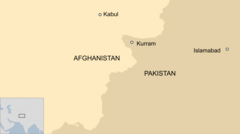In a harrowing event, at least 38 individuals, including women and children, lost their lives when unidentified gunmen attacked a convoy of around 200 passenger vehicles traveling through the remote Kurram district of Pakistan, close to the Afghan border. Reports indicate that the attack specifically targeted the police escort assigned to protect the convoy, an imperative precaution given the region's history of sectarian violence that had previously resulted in numerous fatalities.
Nadeem Aslam Chaudhry, the chief secretary of the Khyber Pakhtunkhwa province, labeled the incident as "a major tragedy," warning that the death toll could potentially increase as further details emerge. At least 11 additional individuals sustained injuries during the ordeal. Eyewitness accounts recount how approximately ten assailants opened fire indiscriminately from both sides of the road, leaving women and children scrambling to seek refuge in nearby homes while police launched a search for the perpetrators.
The majority of the passengers in the convoy identified as Shia Muslims, an important factor as the region has been a hotspot for conflict between Sunni and Shiite communities. The violence that has plagued Kurram this year earlier saw a series of attacks take place, concluding only after a local tribal council called for a ceasefire.
Just last month, another incident on the same highway resulted in the deaths of 15 people, further underlining the persistent cycle of violence tied to sectarian disputes, often influenced by land conflict. The geographical positioning of Kurram also contributes to its volatility, lying adjacent to Afghan provinces teeming with factions such as the Islamic State and the Tehrik-e-Taliban Pakistan (TTP), notorious for their anti-Shia sentiments and activities.
The consequences of this tragedy paint a grim picture of the region's ongoing struggles and the urgent need for effective conflict resolution mechanisms to address the underlying sectarian and militant challenges.
Nadeem Aslam Chaudhry, the chief secretary of the Khyber Pakhtunkhwa province, labeled the incident as "a major tragedy," warning that the death toll could potentially increase as further details emerge. At least 11 additional individuals sustained injuries during the ordeal. Eyewitness accounts recount how approximately ten assailants opened fire indiscriminately from both sides of the road, leaving women and children scrambling to seek refuge in nearby homes while police launched a search for the perpetrators.
The majority of the passengers in the convoy identified as Shia Muslims, an important factor as the region has been a hotspot for conflict between Sunni and Shiite communities. The violence that has plagued Kurram this year earlier saw a series of attacks take place, concluding only after a local tribal council called for a ceasefire.
Just last month, another incident on the same highway resulted in the deaths of 15 people, further underlining the persistent cycle of violence tied to sectarian disputes, often influenced by land conflict. The geographical positioning of Kurram also contributes to its volatility, lying adjacent to Afghan provinces teeming with factions such as the Islamic State and the Tehrik-e-Taliban Pakistan (TTP), notorious for their anti-Shia sentiments and activities.
The consequences of this tragedy paint a grim picture of the region's ongoing struggles and the urgent need for effective conflict resolution mechanisms to address the underlying sectarian and militant challenges.



















